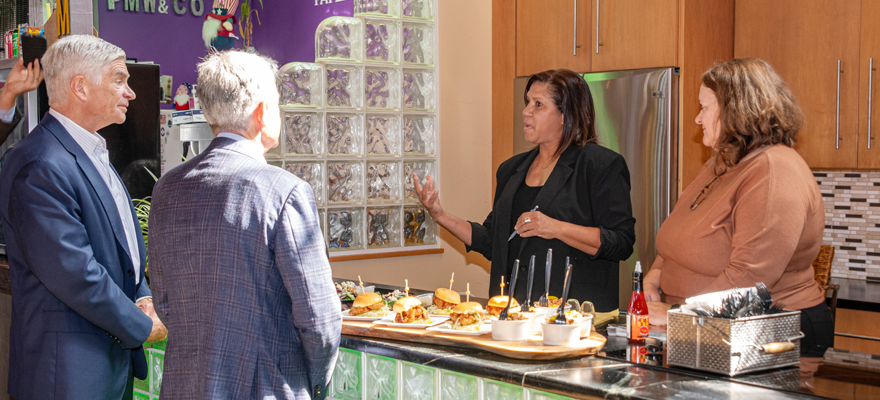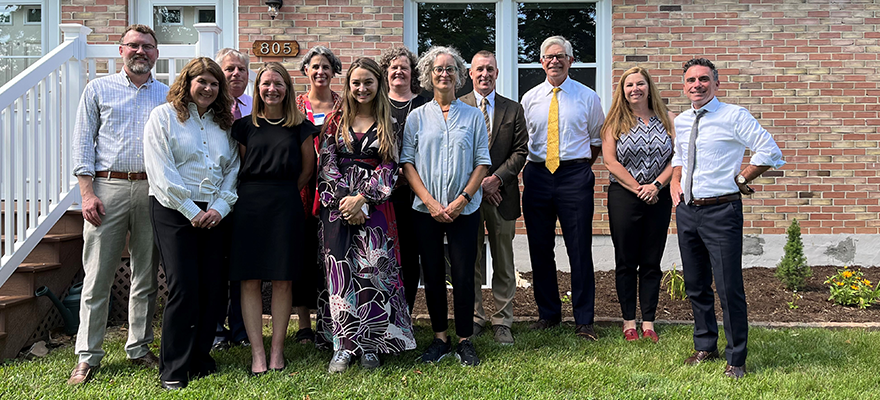A college town in Pennsylvania is tackling affordable housing. In Delaware, they’re clearing pathways to quality jobs. In Nevada, it’s about expanding access to credit for local entrepreneurs.
Together, they’re part of the Philadelphia Fed’s Reinventing Our Communities (ROC) Cohort Program, which allows community groups to collaborate on broadening opportunities and strengthening their local economies.
Since 2020, more than 350 cross-sector community partners in 38 communities across 20 states have joined the program. Ten of the 12 Federal Reserve Banks are also partners in the effort.
“The ROC Cohort program is built on catalyzing local partnerships and community-led solutions,” said Theresa Y. Singleton, senior vice president and community affairs officer at the Philadelphia Fed, who leads the Bank’s economic mobility and community development programs and outreach.
The ROC Cohort program supports the Fed's dual mandate of stable prices and full employment by addressing credit, workforce, and housing barriers in local communities — “all of which contribute to upward economic mobility and full participation in the economy,” said Singleton.
Helping Communities Grow Inclusively
Ali Shott, a community engagement advisor at the Philadelphia Fed and one of the ROC Cohort program managers, points to how the program allows very different communities to unite around similar economic challenges.
Las Vegas, Nevada, and York, Pennsylvania, offer examples. Leaders in both communities found common ground in taking similar approaches to strengthening their local small business ecosystems.

Jennifer Heasley is a York business owner who benefited from this effort. She retired from teaching to “pursue a dream,” she said, which now includes a catering service, cooking classes, and a stand in York's Central Market selling her savory finishing sauces.
When Fed leaders toured downtown York in October 2023, Heasley offered a taste of several of her signature dishes. She also provided some insight into the secret sauce of her success.
Beyond passion and grit, Heasley said, “it takes access to credit and capital.”
Heasley’s business, Sweet Mama's Mambo Sauce, is one of more than 230 York County small businesses that received a BLOOM Business Empowerment Center grant. The center serves as a hub for local entrepreneurs to access business training classes and mentoring, loans, grants, and credit. And since 2018, BLOOM has awarded almost $500,000 to local small businesses owned by women and people of color.
BLOOM Business Empowerment Center's Executive Director Sully Pinos credits the cohort for helping to expand the vision for the center.
“Our ROC Cohort work in 2021 led us to a holistic approach and brought resources together for entrepreneurs in various languages to make them accessible; we also provided funding through grants and loans,” said Pinos.
“It’s a new way to engage the community,” she noted. “We can understand better the needs of businesses. And we can build relationships and trust.”
Collaboration Strengthens Innovation and Powers Sustainable Solutions
Community leaders in State College, Pennsylvania, found that taking a shared approach to addressing housing affordability also opened doors to more sustainable solutions.
According to a 2018 report, housing costs in the area were 35 percent higher than the national average and 48 percent more than the Pennsylvania average. Many residents said they were struggling to keep up — often “paying hundreds of dollars in energy bills,” one resident told Philadelphia Fed leaders during a 2023 visit to the borough.
Morgan Wasikonis, executive director of the HOME Foundation and lead partner of the 2020 ROC Cohort in State College, explains that “the ROC Cohort program challenged us to critically examine how we are advancing inclusion and making housing costs sustainable over time.”
She said that energy efficiency became a priority, not only because of its climate benefits but because it offered consistent, manageable housing costs.
To date, the State College ROC Cohort has helped support almost a dozen energy-efficient renovations across the area. Members continue to meet regularly and seek ways to grow their housing partnerships. More recently, they were supported by the county to apply for national grants to expand their housing equity and sustainability efforts.

Sloane Kaiser, community engagement associate at the Philadelphia Fed and a ROC Cohort Program manager, emphasizes the importance of ongoing planning and collaboration.
“We’re excited to see the innovation in this area develop,” Kaiser said. “Affordable housing will always be an essential part of community development and economic mobility. It supports full employment.”
Building Community-informed, Local Solutions
In Delaware, cohorts have focused on quality jobs and clearing pathways to get them.
In 2020, the Second Chance Employment Collaborative grew out of Wilmington’s participation in the ROC Cohort program. Second Chance focuses on improving workforce systems and access to quality jobs through record expungement. The Collaborative was part of efforts in the community to advance Clean Slate Legislation, which passed in Delaware in June 2021.
“The issues of expungement and second chance hiring are very relevant in Delaware,” said Renata B. Kowalczyk, chief executive officer of the Wilmington Alliance and 2020 ROC Cohort lead. “Twenty-one percent of state residents and a staggering 53 percent of Wilmington residents qualify for expungements,” she said. “This has a major impact on access to quality jobs and economic opportunity.”
Members of Delaware’s 2022 ROC Cohort focused their efforts on connecting the state’s young people with options for education or job training. In 2021, roughly 7 percent of Delaware’s youth between the ages of 16 and 24 were not enrolled in school and not working, according to Measure of America using the U.S. Census Bureau’s American Community Survey.
“Our vision was simple. We wanted to make sure our high school students had a clear path to a career with job mobility – whether straight to work, service, college or entrepreneurship,” said Laurie Girardi, chief strategy officer at United Way of Delaware and the 2022 ROC cohort lead. “If they didn’t have a clear path, how could we put support and resources in place for them through a coordinated cross-sector effort?”
So far, the effort has had several hundred high school students respond. The cohort has also gained support from a growing network of educators, nonprofits, area businesspeople, local and state government, and others who have joined the project to collaborate and expand its opportunities.
In February, the 2024 ROC Cohort Program launched in 11 communities from nine states across the country. Cohorts will focus on either improving regional access to workforce development programs or on inclusive rental housing.
Update on March 11, 2024: The number of participating states has been adjusted, based on the current and former cohorts.
- The views expressed here are solely those of the author and do not necessarily reflect the views of the Federal Reserve Bank of Philadelphia or the Federal Reserve System.

